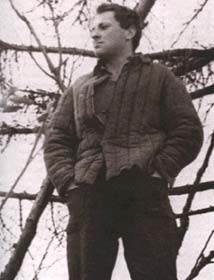 |  |
 |









The trial of Brodsky |
The natural assimilation of Jews in the big Russian-speaking city was intensified by the policy of the Communist Party; by the late 1950s or the early 1960s it produced results. A generation of Jewish young people grew up who were absolutely distant from their ethnic roots; they knew nothing of Jewish traditions and were completely integrated into Russian culture. The most talented and active part of those young people were busy in the arts or science; they were very cultured and had wide erudition in the arts. Most of them considered themselves Russians. However, in their works, they showed features of a Jewish mentality - non-conformism, attention to fundamental ontological problems, and an orientation to intellectual values. But the top of the Party saw them as the representatives of odious Jewry, "hostile" to Soviet society and harmful to it. Iosif Brodsky became the symbol of that Jewry.![]()
In the later 1950s, a circle of poets was formed and Iosif Brodsky was its acknowledged leader. Most of the members were close to A.A. Akhmatova, who regarded Brodsky as the most talented among the young poets of those years. The influence of Brodsky on the city's literary life increased, although he had no possibility to publish his works and he was not a member of the Writers' Union. Together with him, such poets of Jewish origin as Yevgeniy Rein, Vladimir Uflyand, and Vladimir Aronson made up Leningrad's unofficial culture, as well as Alexander Kushner, who existed at the cusp of official and unofficial literature. Party organs and the KGB were not fond of such activities. In 1964, Iosif Brodsky was arrested and put on trial; he was accused of "parasitism".![]()
Soviet law of those years allowed the conviction of anyone who had no constant job and who was not a member of some artistic union. At the trial, an acknowledged poet and translator whose works had been published was accused of a "parasitic modus vivendi". Although such respectable witnesses as Yefim Etkind and Vladimir Admoni were heard in his defense and famous Leningrad lawyer Zoya Toporova destroyed all the arguments of the prosecution, the sentence was pre-determined. Iosif Brodsky was deported to the Norinskaya-village in Arkhangelsk Region. The behavior and some comments of the judge were evidently anti-semitic. Nevertheless, the machinery of judicial punishment failed. Frida Vidgorova attended the trial and, despite the obstacles and threats, wrote down everything that happened in court. Her notes became known worldwide and were spread for many years in samizdat. The most distinguished figures of Soviet culture interceded for Brodsky.![]()
Shortly after, the authorities had to free Brodsky and let him go from the place of his deportation. In 1972, Brodsky emigrated to the United States and became known worldwide as a distinguished Soviet poet; in 1987, he was honored with the Nobel Prize for literature. Brodsky represented Russia in world culture and he did not regard himself a Jew; he was a Christian in his beliefs (although he belonged to no specific denomination). The path of Iosif Brodsky is typical for considerable part of Russian Jewry. Their activity in the framework of Russian culture led assimilated Jews to Western Christianity more often than to the Orthodox Church. The path of Anatoliy Nayman, who was close to Akhmatova, was similar as well as the paths of such outstanding representatives of Petersburg poetry as Victor Krivulin and Yelena Shvarts. They did not give up their origin; however, they belong to Russia (and to all mankind) and they have nothing to do with Jewish life. Many other, less known Petersburg inhabitants abandoned Judaism as well.![]()
I. Brodsky in the deportation in Norinskaya-village. Photo


